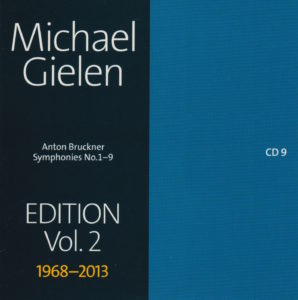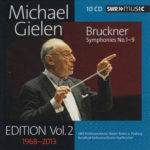 This morning’s conductor of Anton Bruckner’s Symphony No. 8 in C Minor (WAB 108) (nicknamed “The Apocalyptic,” although I don’t know why) is German-born Michael Gielen (1927-).
This morning’s conductor of Anton Bruckner’s Symphony No. 8 in C Minor (WAB 108) (nicknamed “The Apocalyptic,” although I don’t know why) is German-born Michael Gielen (1927-).
The orchestra is SWR Sinfonieorchester Baden-Baden und Frieburg.
I first encountered Maestro Gielen on Day 4 of my 144-day project. On that day, he interpreted Symphony No. 1.
Then again on Day 20, Symphony No. 2.
 Then again on Day 36 Symphony No. 3.
Then again on Day 36 Symphony No. 3.
Then again on Day 52, Symphony No. 4.
Then again on Day 68, Symphony No. 5.
Then again on Day 84, Symphony No. 6.
Then, most recently, on Day 100, Symphony No. 7.
From what I recall, my interest in Mr. Gielen has been hot and cold.
But I’ll reserve the subjective stuff about this recording for later.
First, the objective aspects:
 Bruckner’s Symphony No. 8 in C Minor (WAB 108), composed 1884-1890
Bruckner’s Symphony No. 8 in C Minor (WAB 108), composed 1884-1890
Michael Gielen conducts
Gielen chose the “1st Version 1887” (according to the CD sleeve), edited by Nowak (according to Wikipedia)
SWR Sinfonieorchester Baden-Baden und Frieburg plays
The symphony clocks in at an astonishing 95:43 over two CDS (CD1: 68:38, CD2: 27:09)
This was recorded in Baden-Baden, Germany, on June 2, 2007
Gielen was 80 when he conducted it (the oldest conductor to whom I’ve listened so far?)
Bruckner was 66 when he finished composing it in 1883
This recording was released on the SWR Music label
Bruckner wrote his symphonies in four parts. The time breakdown of this one (Symphony No. 8 in C Minor, “1st Version 1887”), from this particular conductor (Gielen) and this particular orchestra (SWR Sinfonieorchester Baden-Baden und Frieburg) is as follows:
I. Allegro moderato…………………………………………………………………………….18:40
II. Scherzo: Allegro moderato…………………………………………………………19:59
II. Adagio – feierlich langsam; doch nicht schleppend………………………..29:59
IV. Finale: nicht schnell……………………………………………………………………….27:09
Total running time: 95:43 over two CDS (CD1: 68:38, CD2: 27:09)
According to its entry on Wikipedia,
1887 version
This was Bruckner’s first version of the symphony, but was not published until 1972 in an edition edited by Leopold Nowak. It has some significant differences from the more familiar later versions, including a loud ending to the first movement and a different tonality for the climax of the slow movement. It is also notably longer than the 1890 version, and has a different instrumentation (the most significant consistent difference being that the 1890 version has triple rather than double woodwind throughout the first three movements). The double woodwind of the 1887 version gives a somewhat more austere character to the overall sound of the work.
Some scholars support this version of the symphony. Bryan Gilliam, for example, argues that the later version (from 1890) is shorter and smoother, and is hence a dubious concession to the Brahms-loving bourgeoisie of the time. The 1887 version was premiered by Hans-Hubert Schönzeler for the BBC in 1973, and has been recorded by Dennis Russell Davies, Vladimir Fedoseyev, Eliahu Inbal, Georg Tintner, Michael Gielen, Simone Young and Franz Welser-Moest. A digitalization of the North American premiere by Tintner with the National Youth Orchestra of Canada (LP: Jubal 5003/4, 1982) can be heard on John Berky’s website.
Now, the subjective aspects.
My Rating:
Recording quality: 4
Overall musicianship: 4
CD liner notes: 4 (short essays on the Michael Gielen Edition, Bruckner’s symphonies, and the orchestra, translated into English and German)
How does this make me feel: 3
Given the length of this recording – certainly deserving of the Bill Yikes! Award – I hope it’s going to be riveting. I mean, for my ass to remain in my seat for over 90 minutes, this had better touch my soul.
It didn’t.
But the Finale came close.
As I’ve noticed in previous listenings, I tend to favor the Scherzo. That’s where all the interesting melodies and quirkiness usually appears.
But not this time.
This time the movement that captivated me was the Finale. It had the power and the precision I was waiting for from the first minutes of Movement I. Plus, I dug the pizzicato around the 3-4 minute mark. (I love pizzicato, for some reason.)
Speaking of the first movement, I thought the Allegro moderato dragged on – despite its relatively short length. It just didn’t seem to have enough spark to interest me.
Overall, this was well recorded. But it sounded lugubrious, bloated. And why shouldn’t it? At nearly 100 minutes in length, this is the very definition of bloated.
I often use the criteria, “Would I share this with someone who didn’t know about Bruckner’s Eighth?”
My answer to this performance is, “No. I would not.”
Not because it was horrible; rather, because it was way too long and not exciting enough to pull off the extended length.
As always, your mileage may vary.
